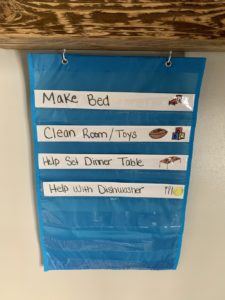My son is 3 years old and I think it’s time to start teaching him about chores. He has a language delay and some other needs so he is just now approaching the milestone of talking and understanding. My son will clean up after himself with help, put his dishes in the sink when prompted and help put clothes in the washer and dryer; but, I know he is capable of additional tasks.
Chores don’t have to be dreadful – they can be fun and rewarding! I have listed what I think are age-appropriate chores, rewards and how to make it fun!
Toddlers
At the age of two, I began letting my son help with tasks around the house. This began the foundation of him cleaning up after himself and wanting to help! He would hand me the silverware out of the dishwasher and he loved feeding our dog her food. These are small, easy tasks for toddlers that can be incorporated into a daily routine. My son thrives on encouragement and praise, so, this is how I made the tasks fun and rewarding.
3 – 4 Years
Now that my son is 3, I plan to make him a chore chart and add a few tasks. Some examples of chores at this age are making their bed, cleaning up their room, helping setting the table for dinner, helping load/unload the dishwasher and helping with pets (if applicable). I would suggest a chore chart with pictures for simple understanding. To make chores fun, try singing songs while cleaning up or adding stickers to the chore chart! My son loves coins. When he completes a chore, I give him a coin to put in his piggy bank. If rewards are chosen for completed chores, other ideas include: choosing a fun activity, a favorite dinner, getting ice cream or picking out a new toy (I love the Dollar Tree for small, inexpensive rewards).
5 – 6 Years
As children reach kindergarten age, it’s about time to gradually add chores. Some ideas include: clearing the dinner table, helping with laundry (sorting/putting away), emptying small trash cans (bathroom/bedroom trash) and watering plants. Making their bed and cleaning up their room could be a part of a daily routine rather than a chore. Try a chore chart with pictures that can be marked as completed whether that be with a dry erase marker or a magnetic check mark. For this age group, I like the idea of a point system for rewards. A point system can be recorded daily or weekly. Children can then “cash in” their points for a reward such as: money, movie night, extra time to stay up at night, a break from chores, extra screen time, a fun night out or a sweet treat. Try numbering the chores and rolling dice to choose a chore, list chores on individual pieces of paper and choose from a hat or turn up some music to make chores fun and interesting!
7-10+ years
Earlier this week, I asked my sister how she manages chores for her daughter (age 9). Her chores are on a rotated schedule and she helps to choose which chores she would like to do. Some ideas include: vacuuming, mopping, laundry, setting the table, helping cook meals, washing dishes, bringing in and putting away groceries, taking out trash, wiping down counters, cleaning windows or pulling weeds. I would suggest a dry-erase chore chart placed on the refrigerator for effective communication and reminders. I think a weekly allowance is appropriate at this age and creates an opportunity to teach the responsibility of money. If allowance is not feasible, a monthly reward is another option; such as going to a restaurant, picking out a new board game or book, visiting the zoo or a gift card. I remember when I was this age, I complained about chores. An idea to make chores fun and tolerable is to do them as a family. As an adult, I still think housework is much more tolerable as a team!
I made a simple DIY chore chart from the dollar tree. I bought a chart for $1. I drew pictures and wrote the name of the chore on each white strip. My son can either put a check mark with a dry erase marker or turn the strip around when the task is completed. Target also has an affordable Melissa and Doug Chart. It’s called a “Responsibility Chart” – I love that it says “responsibility” and not “chore”!
Chores are beneficial because it teaches responsibility, independence, teamwork and good habits. If allowance is given, this is an opportunity to teach saving and spending. As a parent or guardian, you will know when it is best to start chores. It is also important to remember that each child is different and what might work for one child might not work for the other, and that’s OK!






